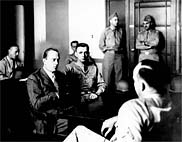December 3, 2001
Tribunal Comparison Taints Courts-Martial, Military Lawyers Say
By WILLIAM GLABERSON
 |
| (The Associated Press) |
| Heinrich Harm Heinck, in suit, during a military commission trial of eight German saboteurs in 1942. Heinck and five others were quickly executed. |
 |
| (Richard Perry/The New York Times) |
| Ronald W. Meister, a former Navy lawyer and judge, says tribunals are not courts-martial. "These commissions are a totally different animal." |
Former military lawyers say they are angered by a public perception, fed most recently by the top White House lawyer, that the military tribunals authorized by President Bush are merely wartime versions of American courts-martial, a routine part of military life with a longstanding reputation for openness and procedural fairness.
In fact, the proposed tribunals are significantly different from courts- martial, the lawyers say, adding that confusion between the two has distorted the debate over the tribunals and unfairly denigrated military justice.
"It bothers me that people are thinking we try thousands of people this way in the courts-martial system," said Ronald W. Meister, a New York lawyer who is a former Navy lawyer and judge.
"We do nothing of the sort," he said. "These commissions are a totally different animal."
John S. Cooke, a retired Army judge who is the chairman of the American Bar Association's committee on armed forces law, said military courts had been tainted by association with the tribunals, which many commentators, politicians and civil libertarians criticized as an effort to find a foolproof shortcut to a guilty verdict.
"There's been a lot of talk about military kangaroo courts," Mr. Cooke said. "Having grown up in the courts-martial system, I'm rather offended by it, because it is a good system that provides more than adequate due process for the men and women in our military service."
Standard military courts closely resemble civilian courts in many ways, Mr. Cooke said. He added that they offered many of the fundamental protections that critics had said the president ignored in his Nov. 13 order authorizing the military tribunals. Courts-martial, for example, are governed by rules of evidence similar to those in civilian courts. They give defendants full rights to appeal a conviction, require proof of guilt beyond a reasonable doubt and require a unanimous decision to impose the death penalty.
But those and many other protections were missing from the sketchy outline of the tribunals proposed in the president's order. The administration is working on more detailed rules, and officials have said the criticism is premature.
But the order specified some details that distinguished the tribunals from courts-martial. The order provides, for instance, that sentences — apparently including the death penalty — can be imposed by a two- thirds vote of the tribunal members.
In courts-martial, the rules limiting the kind of evidence that can be heard are as strict as they are in civilian courts.
Hearsay, for example, is limited in both civilian courts and courts-martial because it is often unreliable. But the president's order suggested that any evidence — apparently including hearsay — would be admitted if it had "probative value to a reasonable person."
Despite the differences between the systems, administration officials have sometimes seemed to confuse the two.
In an Op-Ed article in The New York Times on Friday, Alberto R. Gonzales, the White House counsel, defended the commissions, saying they would be fair.
Mr. Gonzales continued with an assertion that appeared to liken the commissions to courts-martial.
"The American military justice system is the finest in the world," he wrote, "with longstanding traditions of forbidding command influence on proceedings, of providing zealous advocacy by competent defense counsel and of procedural fairness."
Some critics say the administration appears to be fostering the confusion to blunt criticism of the tribunals.
"The confusion benefits the administration," said Eric M. Freedman, a professor of constitutional law at Hofstra University School of Law in Hempstead, N.Y. "If the government can spread the impression that the tribunals are like the courts- martial, that would allay many fears."
In the battle of perception, both sides have been making statements that may not be accurate. Critics have said tribunals will conduct "secret trials."
Mr. Gonzalez wrote that the commissions "will be as open as possible," though the president's order permits closed proceedings.
It is not yet clear how far the administration will go in closing proceedings. But lawyers say the issue of whether the trials will be public also shows the differences between the two military systems.
Courts-martial, like civilian courts, are presumed to be open, and judges close them only in extraordinary circumstances.
Last spring, news organizations from all over the world attended preliminary hearings in the military justice system for Cmdr. Scott D. Waddle, the commander of a Navy submarine that accidentally sank a Japanese fishing trawler off Hawaii in February.
By contrast, the last time the United States used military commissions, German saboteurs were tried, convicted and sentenced to death in closed proceedings in Washington in World War II.
Some lawyers say such contrasts show how different the two systems are.
They say the administration seems unaware that trials that appear to include shortcuts to win convictions may raise suspicions around the world.
Edward F. Sherman, a former Army lawyer who was until recently the dean of Tulane Law School in New Orleans, said a prominent example was that under the president's order, defendants in the tribunals might not be permitted to select their own lawyers.
Defendants in courts-martial are allowed to do so.
Mr. Sherman said that and many other omissions raised questions about how commission trials would be perceived.
"If it appears they're assigning lawyers and just going through the steps and then imposing the death penalty," Mr. Sherman said, "there would be questions around the world about whether these kinds of trials comport with the basic due process we expect in our legal system."
Copyright 2001 The New York Times Company
![]()